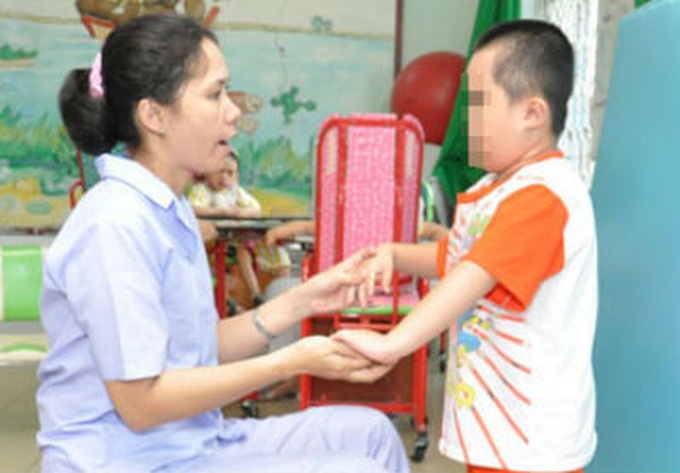A special class has been held for children with autism and cerebral palsy at the Pediatrics Hospital 1 in HCM City.

A teacher helping a boy learn to speak
The class has helped several children deal with their problems and integrate into the community.
Special class
The special class was set up in 1990 under the management of the hospital’s Physio-Therapy and Rehabilitation.
Ha Thi Kim Yen, former director of the ward said, “The class was established after demands by the children’s parents. Most of them have problems with their central nervous systems and face difficulties in their activities, let alone understanding, expressing and thinking.”
According to Yen, it requires a lot of time and effort to take care of such children while most parents still have to work to earn a living. The unique class was the first of its kind in Vietnam.
After a short period of operation, the class received children who suffered from other diseases with priority given to patients with desperate need of care.
Currently, the class houses 32 children, including around eight or nine children with cerebral palsy while the remainder suffer from autism, stunned growth or are hearing impaired.
The class provides comprehensive care for children, ranging from practising moving and chewing, to language, thinking, and repetitive behavioural development.
Teachers also train children in skills to integrate into the community.
Yen said that lunch was not only an opportunity to feed the children but was also considered a good chance to develop their language ability.
Several of the children aged from three to four are still incapable of chewing or find it hard to swallow food.
Several older children even just live on bottle-milk feeding, hindering their tongue and jaw movement and language development.
Some children face mobility difficulties, which is a major obstacle to their mental development.
The class provides the children with specially designed chairs to help them straighten their bodies.
Expansion
The class currently has two major baby-sitters, in addition to physiotherapists and speech therapists.
The hospital’s leaders plan to expand the class in coming time. They will divide it into two major groups to provide care for those who can integrate into the community and those who need special attention.
“When my child was 22 months old, he could not speak or turn his head when being called, nor play with other kids. I took him to Paediatrics Hospital 1 for psychological checkups and doctors said he suffered from slow development. We were advised to send him to the special class. Thanks to the special care, he now can speak and play with others after a year of attending the class. He can also eat and drink by himself. Some teachers in the class said we can bring him home but I want him to stay at the class for some more time to learn how to chew,” a parent from District 7 said.
